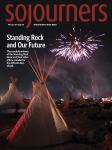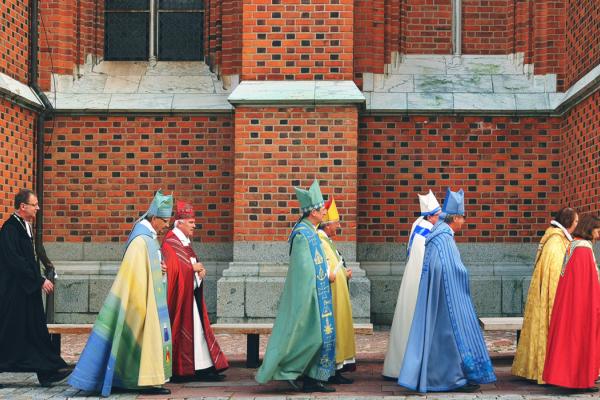IT MUST HAVE been an odd thing, being the Holy Roman Emperor in June 1530, making the long trek to the Bavarian city of Augsburg to meet with a league of rebel states. But this is where Charles V found himself. Stranger yet, he was doing this not to convince these leaders to form a military alliance (though he was hoping to confirm their military fealty), nor to advocate for trade deals or relish the verdant Bavarian countryside.
Instead, the most powerful man in Europe had come to talk theology, with the hope that he could reunite a church fractured by the teachings of a rebel monk and a novice professor a mere 13 years earlier, in 1517. A monk who had since been condemned for heresy and treason in the 1521 Edict of Worms, but who—thanks to his ruler, Frederick III of Saxony—had nonetheless been hiding safely in plain sight ever since.
That wily monk, of course, was Martin Luther.
Thankfully, Luther and his supporters were relegated to the imperial backburner after the Diet at Worms, an imperially sanctioned assembly of the Holy Roman Empire, as global political matters and internal quibbling between testy royals kept Charles busy between 1521 and 1529. So the “Lutherans,” as they began to be called, took advantage of those years to thoroughly educate the priests and populace of Saxony about the most central of Luther’s teachings—the Doctrine of Justification: People “cannot be justified before God by their own strength, merits, or works, but are freely justified for Christ’s sake, through faith, when they believe that they are received into favor, and that their sins are forgiven for Christ’s sake, who, by His death, has made satisfaction for our sins. This faith God imputes for righteousness in His sight (Romans 3 and 4).”
This, the most virulent germ of all Lutheran theology, spread throughout Germany with alarming speed. For a people burdened with the fear that only their actions could save them from damnation—the money they tithed, the Masses they bought, the pilgrimages they took—it was liberating to learn that faith in Christ’s resurrection and the promise of God’s eternal love alone sufficed to save the soul and to save the whole world. Those transformed by this were eager to share the word.
But the emperor’s eyes soon turned eastward to Germany when the Ottoman Empire started marching his way again. A military man, Charles knew that the rebellious Saxon princes who supported Luther were ostensibly his first line of defense against the Turkish army. He aimed to use a military alliance with the Saxons as a way to smooth relations between the German Reformers and the Vatican. To do this, in January 1530 he announced yet another imperial diet.
However, the Lutheran delegation had a different agenda, hoping to use the gathering in Augsburg to make a systematic presentation of the rightness of their ecclesial and civic reforms. They asked Luther and his associates, including a mild-mannered systematics professor named Philipp Melanchthon, to prepare something that could be read before the emperor and assembly, something that would make plain their claim to universal Christian orthodoxy as well as elucidate the reforms they had implemented. For about three months Luther and Melanchthon, along with Justus Jonas and Luther’s confessor, Johannes Bugenhagen, revisited earlier doctrinal statements, wrote letters, and leavened in new insights while Melanchthon compiled and systematized everything. This goulash of theo-political passions eventually produced what we now know as the Augsburg Confession.
The confession was read before the emperor and the court at Augsburg that summer, and Charles received a personal copy composed in exquisite Latin. The Holy Roman Emperor was not moved. Nevertheless, since 1530, the Augsburg Confession has been part of the indispensable foundation for virtually every Lutheran community on the planet, and despite being almost 500 years old, it still has quite pressing relevance and application.
Reclaiming the reforming Spirit
Now this is where I talk a bit about me and my peeps.
Last April, a group of Lutheran friends and colleagues began a movement to reform and adapt our beloved confessional communion for our own time and place. Calling ourselves #decolonizeLutheranism, we have elevated the Augsburg Confession as a central text, both for its historical importance and to highlight our conviction that the same radically reforming Spirit that guided the confession’s original authors has also been guiding us. As such, the document gives us a vital link with our confessional heritage, but also a firm theological beachhead from which we announce our protest against much of contemporary Lutheranism in the United States—a beachhead centered primarily upon Article VII, “On the Church.”
“The church is the congregation of saints, in which the gospel is rightly taught and the sacraments are rightly administered,” it reads. “And to the true unity of the church it is enough to agree concerning the doctrine of the gospel and the administration of the sacraments. Nor is it necessary that human traditions, that is, rites or ceremonies, instituted by [people], should be everywhere alike. As Paul says: One faith, one Baptism, one God and Father of all (Ephesians 4:5-6).”
In the United States, most of the emphasis on Article VII has been on preaching the gospel and administering the sacraments, and rightly so. But since many Lutherans put up strange roadblocks to what it means to be numbered among “the congregation of the saints,” they constrain the fullest reach of the gospel as well as truncate who is even around to partake in the sacraments. At no point when Melanchthon was writing about the “congregation of the saints” did he mention anything about skin color or language. Nor did he ever write about cerebral palsy or deafness, incarceration or addiction, or gender or sexual orientation as characteristics that would deny someone their God-given membership in the congregation of the saints. But these exclusions happen so often as to almost be a rule.
Furthermore, if Article VII makes it plain that it is not necessary for rites or ceremonies to “be everywhere alike”—things such as music and worship styles, food, and cultural expressions such as clothing and adornment—why are these so often presented as markers of Lutheranism and, as such, necessary for orthodoxy? Why is the passionate, unrestrained joy of the black church so often met with uncomfortable shrugs in so many white Lutheran churches, or 20-minute peace-sharing sessions among luteranos latinos talked about by many Lutheran pastors as “too much?” And why would a seminarian of Middle Eastern descent be told that, to be ordained, he has to “act like a Norwegian Lutheran pastor”? How is it possible, in these days, that cultural and ethnic biases that actually go against our most central confessional document are actually considered signs of confessional fealty?
Those of us in #decolonizeLutheranism seek to engage the Augsburg Confession as one might engage an iron crowbar: prying open the gates of our earthbound communion, which so many Lutherans in our country have barred shut, defending the hegemony of the white, rich, straight, cisgender, and able-bodied majority who control the lion’s share of the church’s money and power. For these acts of exclusion, #decolonizeLutheranism calls all Lutherans to account.
We in #decolonizeLutheranism also call ourselves into account. Since many among our leaders and supporters have suffered under the many phobias lurking in our own pews, we understand that by lifting up the Augsburg Confession we are likewise embracing a document that has been used as a tool of white supremacy and domination, used to give a religious patina to the subjugation of people’s lives and land in the name of freedom and progress. We admit to and repent of the pain to which this document has contributed.
We are confident that Luther himself would have agreed with us. After all, didn’t he launch the first thesis of the Reformation with the reminder that Jesus has intended “the entire life of believers should be one of repentance”? This repentance has unleashed among the members of #decolonizeLutheranism a great love that is transforming us to become catalysts for the creation of a church that we have always wished for and sought. We have begun to ask ourselves, “Who is not among us?” and “When people come to our table, what are we doing to make sure that they are seen, welcomed, and loved?” Then we throw ourselves headlong into welcoming and loving.
Many Lutheran churches, and many Christian churches in general, are far from representing the diversity of the United States. The Holy Spirit has called #decolonizeLutheranism to work on this, and we are answering as faithfully as we can. The congregation of the saints deserves it. And the call of the gospel demands it.

Got something to say about what you're reading? We value your feedback!
